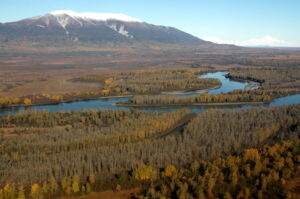
Court tells state to act on water rights
An Alaska Superior Court Judge ruled last week that the State of Alaska’s delay in making decisions on water use applications that support protecting fish habitat is unreasonable.

Aerial view of the Chuitna River.
A court order gives DNR until June 30 to adjudicate the applications. The ruling stems from a lawsuit filed by Trustees in 2011 arguing that DNR had failed to uphold due process for our client, the Chuitna Citizens Coalition. The coalition applied for instream flow reservations in 2009 to protect fish and wildlife.
At the time, a mining proposal called for destroying miles and miles of salmon habitat. DNR refused to process the coalition’s applications, but issued a water permit to the coal mining company.
DNR eventually granted one of the coalition’s applications for a water right in Middle Creek in 2015, but PacRim Coal submitted an administrative appeal. The mining company has since pulled out of the proposed Chuitna mining project, and DNR has refused to adjudicate the applications ever since.

Some of the people fighting to keep mining out of the Chuitna.
Why care about instream flow reservations?
Instream flow reservations require a minimum amount of water to be kept in rivers, streams and other water bodies. Extraction industries regularly apply for reservations to remove water from streams to use in mining and development processes, or to reroute for other uses.
Chuitna citizens applied for these water reservations in the Chuitna watershed to preserve the water needed by fish and wildlife, which in turn provide food and the cultural, social, and economic foundation of the communities in the region.
Court expresses frustration
“Four and a half years later and nearly nine years after its first application was filed Chuitna still does not have final adjudications of its three applications,” according to the court order issued May 10th. “… the court allowed DNR to proceed on its own, expecting that DNR would proceed in good faith to issue final adjudications. Unfortunately, the court’s trust in DNR appears to have been misplaced.”
The state’s attorney suggested it might try to appeal the order to the Alaska Supreme Court.


